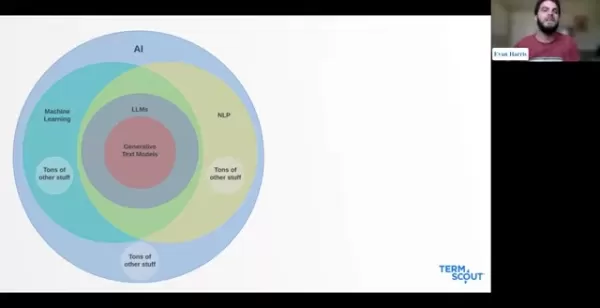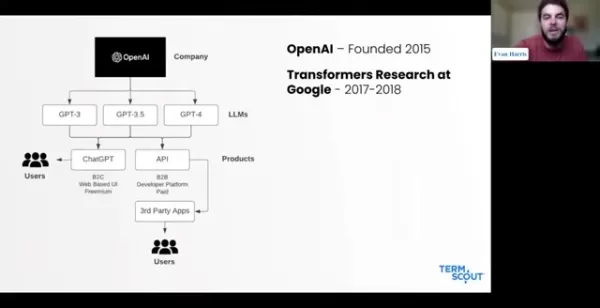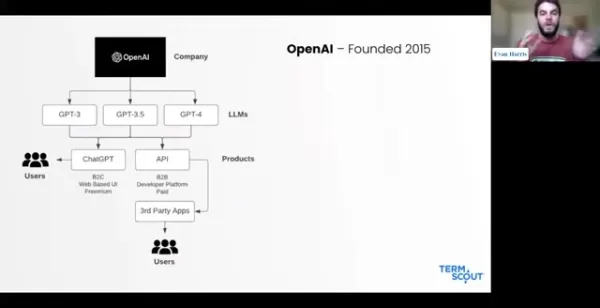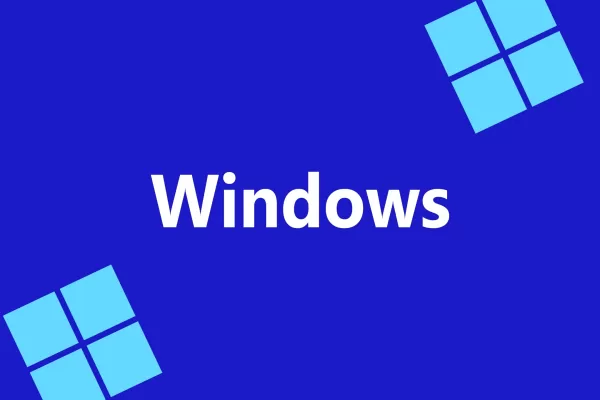AI in Contracts: A Comprehensive Guide for Legal Professionals
Artificial Intelligence (AI) has made a profound impact across various industries, and the legal sector is no exception. As AI technology continues to advance, it's crucial for legal professionals to grasp its potential and limitations, especially in the realm of contract management. This guide delves into the essentials of AI in contracts, its current applications, and how legal professionals can harness AI to boost their efficiency and effectiveness in handling contract-related tasks. Embracing AI can help you stay competitive in the rapidly evolving landscape of legal technology!
Key Points
- AI serves as a powerful tool to complement, not replace, the work of contract professionals.
- Machine learning, natural language processing (NLP), and generative AI are the cornerstone technologies in legal tech.
- Precise language is vital when integrating AI into contract management.
- Data privacy and security must be prioritized when using AI platforms for managing contracts.
- Utilizing AI can greatly enhance the processes of contract review, negotiation, and compliance.
Understanding AI Fundamentals in Contract Management
What is Artificial Intelligence in Legal Tech?
The tech world has been buzzing about AI's growing influence over the past six months, and its integration into contract management is transforming the way legal professionals operate. At its core, AI mimics human thinking using computers. It's a broad field with various techniques and tools, and understanding these basics is essential for legal professionals. Before diving in, let's explore what AI truly entails.

Understanding precise language is key when working with AI in contracts. We all know how crucial clear and precise language is in contracts, and the same goes for AI. Precise language and clear definitions are vital for implementing AI accurately and effectively.
Initially, AI's role in administrative tasks was centered around Data Extraction, pulling names, dates, and other crucial information from contracts. However, the landscape is shifting rapidly!
- Machine Learning (ML): A subset of AI that allows software to learn from data without explicit programming. It finds the best results and improves through learning and trial-and-error processes.
- Natural Language Processing (NLP): Enables computers to understand and process human language, allowing AI to interpret large language models and extract meaningful insights.
- Generative Text Models: Algorithms capable of generating new text, similar to what we see with ChatGPT. They can create templates, review, or rewrite contracts, aiding legal professionals in their work.
These technologies, when combined, fuel innovation in the legal tech industry, opening new avenues for contract drafting, review, and negotiation.
The Key to AI is Precise Language
Let's get to the heart of the matter. AI relies heavily on the ability to clearly define data, processes, or terms. Just like contracts, clarity is essential for achieving results with AI.
Yet, there's more we can do to maximize the potential of AI and fully utilize these new technologies:
- Adopting new tools
- Adopting new processes
- Embracing the future with excitement

AI in contracting and for legal professionals isn't some daunting new technology; it's a tool designed to help legal professionals accomplish tasks faster, cheaper, and better. The key to real change is embracing and getting excited about the possibilities!
OpenAI and Generative Text Models
Breaking Down OpenAI
You might already be familiar with OpenAI and similar entities. Let's dissect what they're all about and their technological offerings:

- Company: OpenAI - Founded in 2015
- Large Language Models (LLMs): GPT-3, GPT-3.5, GPT-4
- Products: ChatGPT (B2C), API (B2B)
The AI world is buzzing with activity, encompassing areas like computer vision and robotics. Now that we've covered the basics, let's see how this technology intersects with the legal profession.
Practical Application: How to Use AI in Your Contract Review Workflow
Data Extraction with Amazon Textract
Amazon Textract, offered by Amazon Web Services (AWS), uses machine learning to extract text and data from scanned documents and images. It goes beyond simple Optical Character Recognition (OCR) to identify and extract data, including from tables and forms, which is incredibly useful for data extraction.

This service excels at:
- Automating data entry
- Speeding up document processing
- Reducing manual errors
Another service, Amazon Comprehend, is designed to derive insights from unstructured text.

These Amazon products efficiently extract necessary data from documents, aiding in automation, document review, and error reduction.
Elevate Legal Contract Analysis with TermScout
TermScout offers tools that empower legal professionals. When you upload a contract, the tool helps determine key information such as the contract's purpose and its risk level.

Moreover, AI can generate answers that provide substantive legal advice. This involves asking the right questions to address pain points and understanding how the technology functions.
With TermScout's tools, you're on your way to efficient contract management. Here are some important reminders:
- Contracts contain valuable information for your client.
- Contracts hold your client's confidential information.
- Contracts include legal terms that third parties agree to protect.
Keeping these points in mind when using AI tools will make your decision-making process much smoother.
TermScout Pricing Plans (For Law Insider Subscribers)
Plan Information
It's financially wise to start working with AI! The Scout Plan, typically priced at $99 a month, is just $49 a month for Law Insider subscribers.
The Scout plan offers unlimited AI review capabilities, a stark contrast to some AI adoption rates that can soar to $100,000.
Head over to Termscout.com to find a plan that suits your needs!
Benefits and Challenges of AI in Contracts
Pros
- Increased efficiency
- Reduced costs
- Improved accuracy
- Enhanced risk management
- Better stakeholder collaboration
Cons
- Data privacy and security concerns
- Potential bias in algorithms
- Need for human oversight
- Implementation costs
- Integration challenges
- Dependence on data quality
Frequently Asked Questions
Will AI replace contract professionals?
While AI won't outright replace contract professionals, those who leverage AI will have a competitive edge over those who don't. It's all about using AI as a tool to enhance your skills and capabilities.
What are some of the key technologies behind AI in contract management?
Machine learning, natural language processing (NLP), and generative text models are the foundational technologies driving value in contract management.
Related Questions
How can AI improve contract lifecycle management (CLM)?
AI can revolutionize contract lifecycle management by enhancing processes across the entire cycle, from initial drafting to ongoing compliance. Here's how:
- Creation: AI-powered tools can auto-generate contract drafts using pre-approved templates and clause libraries, streamlining the initial drafting phase.
- Negotiation: AI can analyze terms, pinpoint risks, and suggest favorable alternatives, making negotiations smoother and more efficient.
- Execution: AI streamlines approval workflows and automates signature collection, accelerating the execution process.
- Compliance: Post-execution, AI monitors key dates and obligations to ensure compliance, flags potential breaches, and provides valuable performance insights.
These capabilities not only improve accuracy, efficiency, and reduce errors but also lead to cost savings. Additionally, they enhance decision-making, promote proactive risk management, and facilitate better data-driven insights and stakeholder collaboration. By automating repetitive tasks, AI empowers legal teams to focus on higher-value strategic initiatives.
Related article
 Walmart Achieves Enterprise AI Scale With Unified Framework Driving Thousands of Use Cases
Walmart is pioneering enterprise-scale implementation of autonomous AI systems through an engineering-driven approach to trust architecture. Their VP of Emerging Technology Desirée Gosby revealed at VB Transform 2025 how the retail leader operational
Walmart Achieves Enterprise AI Scale With Unified Framework Driving Thousands of Use Cases
Walmart is pioneering enterprise-scale implementation of autonomous AI systems through an engineering-driven approach to trust architecture. Their VP of Emerging Technology Desirée Gosby revealed at VB Transform 2025 how the retail leader operational
 Windows Adds Support for AI App Interconnect Standard
Microsoft is doubling down on its AI strategy for Windows with two major developments: native integration of the Model Context Protocol (MCP) and the introduction of Windows AI Foundry. These foundational moves pave the way for Microsoft's vision of
Windows Adds Support for AI App Interconnect Standard
Microsoft is doubling down on its AI strategy for Windows with two major developments: native integration of the Model Context Protocol (MCP) and the introduction of Windows AI Foundry. These foundational moves pave the way for Microsoft's vision of
 Unlock Success with AI-Powered Proposal Writing: Your Definitive Guide
In today's competitive business landscape, effective proposal creation can make or break deals. Proposal Kit revolutionizes this process through its cutting-edge AI integration with ChatGPT, enabling professionals to craft persuasive proposals with u
Comments (3)
0/200
Unlock Success with AI-Powered Proposal Writing: Your Definitive Guide
In today's competitive business landscape, effective proposal creation can make or break deals. Proposal Kit revolutionizes this process through its cutting-edge AI integration with ChatGPT, enabling professionals to craft persuasive proposals with u
Comments (3)
0/200
![PeterSanchez]() PeterSanchez
PeterSanchez
 October 10, 2025 at 4:30:36 PM EDT
October 10, 2025 at 4:30:36 PM EDT
L'IA dans les contrats, c'est vraiment l'avenir ! ⚖️ Ça fait peur de voir à quelle vitesse ça évolue... Est-ce que les avocats vont être remplacés par des robots un jour ? En tout cas ce guide a l'air super complet, merci pour le partage !


 0
0
![GraceWright]() GraceWright
GraceWright
 August 17, 2025 at 1:01:00 PM EDT
August 17, 2025 at 1:01:00 PM EDT
This guide on AI in contracts is super insightful! It's wild how AI is shaking up the legal world. Makes me wonder if smart contracts will soon outsmart the lawyers! 😄 Curious to see how this tech evolves.


 0
0
![JasonSanchez]() JasonSanchez
JasonSanchez
 July 21, 2025 at 9:25:03 PM EDT
July 21, 2025 at 9:25:03 PM EDT
This guide is a game-changer for lawyers! AI in contract management sounds like a huge time-saver, but I wonder how it handles tricky clauses. Anyone tried it yet? 😄


 0
0
Artificial Intelligence (AI) has made a profound impact across various industries, and the legal sector is no exception. As AI technology continues to advance, it's crucial for legal professionals to grasp its potential and limitations, especially in the realm of contract management. This guide delves into the essentials of AI in contracts, its current applications, and how legal professionals can harness AI to boost their efficiency and effectiveness in handling contract-related tasks. Embracing AI can help you stay competitive in the rapidly evolving landscape of legal technology!
Key Points
- AI serves as a powerful tool to complement, not replace, the work of contract professionals.
- Machine learning, natural language processing (NLP), and generative AI are the cornerstone technologies in legal tech.
- Precise language is vital when integrating AI into contract management.
- Data privacy and security must be prioritized when using AI platforms for managing contracts.
- Utilizing AI can greatly enhance the processes of contract review, negotiation, and compliance.
Understanding AI Fundamentals in Contract Management
What is Artificial Intelligence in Legal Tech?
The tech world has been buzzing about AI's growing influence over the past six months, and its integration into contract management is transforming the way legal professionals operate. At its core, AI mimics human thinking using computers. It's a broad field with various techniques and tools, and understanding these basics is essential for legal professionals. Before diving in, let's explore what AI truly entails.

Understanding precise language is key when working with AI in contracts. We all know how crucial clear and precise language is in contracts, and the same goes for AI. Precise language and clear definitions are vital for implementing AI accurately and effectively.
Initially, AI's role in administrative tasks was centered around Data Extraction, pulling names, dates, and other crucial information from contracts. However, the landscape is shifting rapidly!
- Machine Learning (ML): A subset of AI that allows software to learn from data without explicit programming. It finds the best results and improves through learning and trial-and-error processes.
- Natural Language Processing (NLP): Enables computers to understand and process human language, allowing AI to interpret large language models and extract meaningful insights.
- Generative Text Models: Algorithms capable of generating new text, similar to what we see with ChatGPT. They can create templates, review, or rewrite contracts, aiding legal professionals in their work.
These technologies, when combined, fuel innovation in the legal tech industry, opening new avenues for contract drafting, review, and negotiation.
The Key to AI is Precise Language
Let's get to the heart of the matter. AI relies heavily on the ability to clearly define data, processes, or terms. Just like contracts, clarity is essential for achieving results with AI.
Yet, there's more we can do to maximize the potential of AI and fully utilize these new technologies:
- Adopting new tools
- Adopting new processes
- Embracing the future with excitement

AI in contracting and for legal professionals isn't some daunting new technology; it's a tool designed to help legal professionals accomplish tasks faster, cheaper, and better. The key to real change is embracing and getting excited about the possibilities!
OpenAI and Generative Text Models
Breaking Down OpenAI
You might already be familiar with OpenAI and similar entities. Let's dissect what they're all about and their technological offerings:

- Company: OpenAI - Founded in 2015
- Large Language Models (LLMs): GPT-3, GPT-3.5, GPT-4
- Products: ChatGPT (B2C), API (B2B)
The AI world is buzzing with activity, encompassing areas like computer vision and robotics. Now that we've covered the basics, let's see how this technology intersects with the legal profession.
Practical Application: How to Use AI in Your Contract Review Workflow
Data Extraction with Amazon Textract
Amazon Textract, offered by Amazon Web Services (AWS), uses machine learning to extract text and data from scanned documents and images. It goes beyond simple Optical Character Recognition (OCR) to identify and extract data, including from tables and forms, which is incredibly useful for data extraction.

This service excels at:
- Automating data entry
- Speeding up document processing
- Reducing manual errors
Another service, Amazon Comprehend, is designed to derive insights from unstructured text.

These Amazon products efficiently extract necessary data from documents, aiding in automation, document review, and error reduction.
Elevate Legal Contract Analysis with TermScout
TermScout offers tools that empower legal professionals. When you upload a contract, the tool helps determine key information such as the contract's purpose and its risk level.

Moreover, AI can generate answers that provide substantive legal advice. This involves asking the right questions to address pain points and understanding how the technology functions.
With TermScout's tools, you're on your way to efficient contract management. Here are some important reminders:
- Contracts contain valuable information for your client.
- Contracts hold your client's confidential information.
- Contracts include legal terms that third parties agree to protect.
Keeping these points in mind when using AI tools will make your decision-making process much smoother.
TermScout Pricing Plans (For Law Insider Subscribers)
Plan Information
It's financially wise to start working with AI! The Scout Plan, typically priced at $99 a month, is just $49 a month for Law Insider subscribers.
The Scout plan offers unlimited AI review capabilities, a stark contrast to some AI adoption rates that can soar to $100,000.
Head over to Termscout.com to find a plan that suits your needs!
Benefits and Challenges of AI in Contracts
Pros
- Increased efficiency
- Reduced costs
- Improved accuracy
- Enhanced risk management
- Better stakeholder collaboration
Cons
- Data privacy and security concerns
- Potential bias in algorithms
- Need for human oversight
- Implementation costs
- Integration challenges
- Dependence on data quality
Frequently Asked Questions
Will AI replace contract professionals?
While AI won't outright replace contract professionals, those who leverage AI will have a competitive edge over those who don't. It's all about using AI as a tool to enhance your skills and capabilities.
What are some of the key technologies behind AI in contract management?
Machine learning, natural language processing (NLP), and generative text models are the foundational technologies driving value in contract management.
Related Questions
How can AI improve contract lifecycle management (CLM)?
AI can revolutionize contract lifecycle management by enhancing processes across the entire cycle, from initial drafting to ongoing compliance. Here's how:
- Creation: AI-powered tools can auto-generate contract drafts using pre-approved templates and clause libraries, streamlining the initial drafting phase.
- Negotiation: AI can analyze terms, pinpoint risks, and suggest favorable alternatives, making negotiations smoother and more efficient.
- Execution: AI streamlines approval workflows and automates signature collection, accelerating the execution process.
- Compliance: Post-execution, AI monitors key dates and obligations to ensure compliance, flags potential breaches, and provides valuable performance insights.
These capabilities not only improve accuracy, efficiency, and reduce errors but also lead to cost savings. Additionally, they enhance decision-making, promote proactive risk management, and facilitate better data-driven insights and stakeholder collaboration. By automating repetitive tasks, AI empowers legal teams to focus on higher-value strategic initiatives.
 Walmart Achieves Enterprise AI Scale With Unified Framework Driving Thousands of Use Cases
Walmart is pioneering enterprise-scale implementation of autonomous AI systems through an engineering-driven approach to trust architecture. Their VP of Emerging Technology Desirée Gosby revealed at VB Transform 2025 how the retail leader operational
Walmart Achieves Enterprise AI Scale With Unified Framework Driving Thousands of Use Cases
Walmart is pioneering enterprise-scale implementation of autonomous AI systems through an engineering-driven approach to trust architecture. Their VP of Emerging Technology Desirée Gosby revealed at VB Transform 2025 how the retail leader operational
 Windows Adds Support for AI App Interconnect Standard
Microsoft is doubling down on its AI strategy for Windows with two major developments: native integration of the Model Context Protocol (MCP) and the introduction of Windows AI Foundry. These foundational moves pave the way for Microsoft's vision of
Windows Adds Support for AI App Interconnect Standard
Microsoft is doubling down on its AI strategy for Windows with two major developments: native integration of the Model Context Protocol (MCP) and the introduction of Windows AI Foundry. These foundational moves pave the way for Microsoft's vision of
 Unlock Success with AI-Powered Proposal Writing: Your Definitive Guide
In today's competitive business landscape, effective proposal creation can make or break deals. Proposal Kit revolutionizes this process through its cutting-edge AI integration with ChatGPT, enabling professionals to craft persuasive proposals with u
Unlock Success with AI-Powered Proposal Writing: Your Definitive Guide
In today's competitive business landscape, effective proposal creation can make or break deals. Proposal Kit revolutionizes this process through its cutting-edge AI integration with ChatGPT, enabling professionals to craft persuasive proposals with u
 October 10, 2025 at 4:30:36 PM EDT
October 10, 2025 at 4:30:36 PM EDT
L'IA dans les contrats, c'est vraiment l'avenir ! ⚖️ Ça fait peur de voir à quelle vitesse ça évolue... Est-ce que les avocats vont être remplacés par des robots un jour ? En tout cas ce guide a l'air super complet, merci pour le partage !


 0
0
 August 17, 2025 at 1:01:00 PM EDT
August 17, 2025 at 1:01:00 PM EDT
This guide on AI in contracts is super insightful! It's wild how AI is shaking up the legal world. Makes me wonder if smart contracts will soon outsmart the lawyers! 😄 Curious to see how this tech evolves.


 0
0
 July 21, 2025 at 9:25:03 PM EDT
July 21, 2025 at 9:25:03 PM EDT
This guide is a game-changer for lawyers! AI in contract management sounds like a huge time-saver, but I wonder how it handles tricky clauses. Anyone tried it yet? 😄


 0
0





























